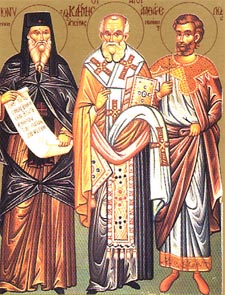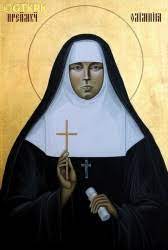✠✠✠✠✠
The Hieromartyr Clement was born in the Galatian city of Ancyra in the year 258, of a pagan father and a Christian mother. He lost his father when he was an infant, and his mother when he was twelve. She predicted a martyr’s death for him because of his belief in Christ.
A woman named Sophia adopted him and raised him in the fear of God. During a terrible famine in Galatia, several pagans turned out their own children, not having the means to feed them. Sophia took in these unfortunates, and fed and clothed them. Saint Clement assisted her in this. He taught the children and prepared them for Baptism. Many of them died as martyrs for Christ.
Saint Clement was made a reader, and later a deacon. When he was eighteen he was ordained to the holy priesthood, and at age twenty he was consecrated Bishop of Ancyra. Soon afterwards the persecution against Christians under Diocletian (284-305) broke out.
Bishop Clement was denounced as a Christian and arrested. Dometian, the governor of Galatia, tried to make the saint worship the pagan gods, but Saint Clement firmly confessed his faith and valiantly withstood all the tortures.
They suspended him on a tree and raked his body with sharp iron instruments so that his entrails could be seen. They smashed his mouth with stones, and they turned him on a wheel and burned him over a low fire. The Lord preserved His sufferer and healed his lacerated body.
Then Dometian sent the saint to Rome to the emperor Diocletian himself, with a report that Bishop Clement had been fiercely tortured, but had proven unyielding. Diocletian, seeing the martyr completely healthy, did not believe the report and subjected him to even crueller tortures, and then had him locked up in prison.
Many of the pagans, seeing the bravery of the saint and the miraculous healing of his wounds, believed in Christ. People flocked to Saint Clement in prison for guidance, healing and Baptism, so that the prison was literally transformed into a church. When word of this reached the emperor, many of these new Christians were executed.
Diocletian, struck by the amazing endurance of Saint Clement, sent him to Nicomedia to his co-emperor Maximian. On the ship, the saint was joined by his disciple Agathangelus, who had avoided being executed with the other confessors, and who now wanted to suffer and die for Christ with Bishop Clement.
The emperor Maximian in turn sent Saints Clement and Agathangelus to the governor Agrippina, who subjected them to such inhuman torments, that even the pagan on-lookers felt pity for the martyrs and they began to pelt the torturers with stones.
Having been set free, the saints healed an inhabitant of the city through the laying on of hands and they baptized and instructed people, thronging to them in multitudes. Arrested again on orders of Maximian, they were sent home to Ancyra, where the ruler Cyrenius had them tortured. Then they were sent to the city of Amasea to the proconsul Dometius, known for his great cruelty.
In Amasea, the martyrs were thrown into hot lime. They spent a whole day in it and remained unharmed. They flayed them, beat them with iron rods, set them on red-hot beds, and poured sulfur on their bodies. All this failed to harm the saints, and they were sent to Tarsus for new tortures. In the wilderness along the way, Saint Clement had a revelation that he would suffer a total of twenty-eight years for Christ. Then having endured a multitude of tortures, the saints were locked up in prison.
Saint Agathangelus was beheaded with the sword on November 5. The Christians of Ancyra freed Saint Clement from prison and took him to a cave church. There, after celebrating Liturgy, the saint announced to the faithful the impending end of the persecution and his own martyrdom. On January 23, the holy hierarch was killed by soldiers from the city, who stormed the church. The saint was beheaded as he stood before the altar and offered the Bloodless Sacrifice. Two deacons, Christopher and Chariton, were beheaded with him, but no one else was harmed.
Troparion — Tone 4
You sprang up, most holy one, / as a branch and stem of holiness, / a most sacred flower of the contest of martyrdom / and as a most sweet fruit given by God to the faithful. / But as one who shared the struggle of the martyrs / and the throne of hierarchs, / intercede with Christ God that our souls may be saved.
Kontakion — Tone 4
You have become an honoured branch of the vine of Christ, / revealed as one of many many struggles, / all-praised Clement, / with your fellow champion you cried out: / “Christ is the shining joy of martyrs.”
✠✠✠✠✠
Podlasie is an area in modern eastern Poland that, in the 18th-century, was governed by the Russian Empire. Russian sovereigns sought to bring all Eastern-rite Catholics into the Orthodox Church. Catherine II suppressed the Greek Catholic church in Ukraine in 1784. Nicholas I did the same in Belarus and Lithuania in 1839. Alexander II did the same in the Byzantine-rite Eparchy of Chelm in 1874 and officially suppressed the Eparchy in 1875. The bishop and the priests who refused to join the Orthodox Church were deported to Siberia or imprisoned. The laity, left on their own, had to defend their Church, their liturgy, and their union with Rome.
On 24 January 1874 soldiers entered the village of Pratulin to transfer the parish to Orthodox control. Many of the faithful gathered to defend their parish and church. The soldiers tried to disperse the people but failed. Their commander tried to bribe the parishioners to abandon Rome but failed. He threaten them with assorted punishments, but this failed to move them. Deciding that a show of force was needed, the commander ordered his troops to fire on the unarmed, hymn-singing laymen. Thirteen of the faithful died, most married men with families, ordinary men with great faith.
We know almost nothing about their lives outside of this incident. Their families were not allowed to honour them or participate in the funerals, and the authorities hoped they would be forgotten. They were:
On 24 January 1874 soldiers entered the village of Pratulin to transfer the parish to Orthodox control. Many of the faithful gathered to defend their parish and church. The soldiers tried to disperse the people but failed. Their commander tried to bribe the parishioners to abandon Rome but failed. He threaten them with assorted punishments, but this failed to move them. Deciding that a show of force was needed, the commander ordered his troops to fire on the unarmed, hymn-singing laymen. Thirteen of the faithful died, most married men with families, ordinary men with great faith.
We know almost nothing about their lives outside of this incident. Their families were not allowed to honour them or participate in the funerals, and the authorities hoped they would be forgotten. They were:
- Anicet Hryciuk
- Bartlomiej Osypiuk
- Daniel Karmasz
- Filip Geryluk
- Ignacy Franczuk
- Jan Andrzejuk
- Konstanty Bojko
- Konstanty Lukaszuk
- Lukasz Bojko
- Maksym Hawryluk
- Michal Wawryszuk
- Onufry Wasyluk
- Wincenty Lewoniu
✠✠✠✠✠
The Servant of God Sr Olympia Bida was born in 1903 in the village of Tsebliv, Lviv District. She entered the Sisters of St Joseph and served In various towns and villages as a teacher of catechism, director of novices, attendant to the aged and infirm. She had a special charism for youth and personally attended to the education of a number of young women. She was appointed superior of the convent in the town of Kheriv, and did her best to see to the spiritual and social needs of the people in spite of the Communist pressure surrounding their work. In 1951, she was arrested with two other sisters, imprisoned for a while, then exiled to the Tomsk region of Siberia.
Under conditions of heavy forced labour, Sr Olympia tried to perform her duties as superior and organized her sisters and other sisters in other camps to come together and to pray and support each other. Succumbing to a serious illness, she died on 28 January 1952.



No comments:
Post a Comment
Comments are subject to deletion if they are not germane. I have no problem with a bit of colourful language, but blasphemy or depraved profanity will not be allowed. Attacks on the Catholic Faith will not be tolerated. Comments will be deleted that are republican (Yanks! Note the lower case 'r'!), attacks on the legitimacy of Pope Leo XIV as the Vicar of Christ, the legitimacy of the House of Windsor or of the claims of the Elder Line of the House of France, or attacks on the legitimacy of any of the currently ruling Houses of Europe.